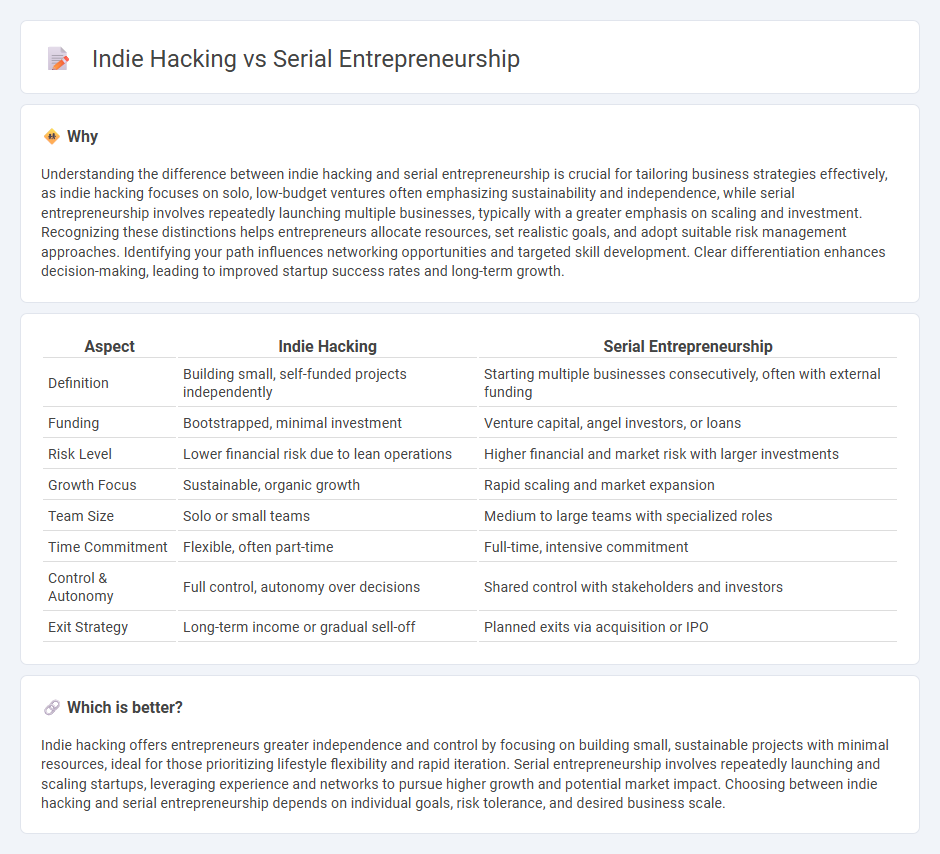
Indie hacking involves building small, self-funded businesses with a focus on independence and rapid iteration, often leveraging digital tools and automation. Serial entrepreneurship is characterized by repeatedly launching and scaling multiple startups, typically with external funding and a drive for larger market impact. Explore the distinct strategies and mindsets that define indie hackers and serial entrepreneurs to understand which path suits your goals.
Why it is important
Understanding the difference between indie hacking and serial entrepreneurship is crucial for tailoring business strategies effectively, as indie hacking focuses on solo, low-budget ventures often emphasizing sustainability and independence, while serial entrepreneurship involves repeatedly launching multiple businesses, typically with a greater emphasis on scaling and investment. Recognizing these distinctions helps entrepreneurs allocate resources, set realistic goals, and adopt suitable risk management approaches. Identifying your path influences networking opportunities and targeted skill development. Clear differentiation enhances decision-making, leading to improved startup success rates and long-term growth.
Comparison Table
| Aspect | Indie Hacking | Serial Entrepreneurship |
|---|---|---|
| Definition | Building small, self-funded projects independently | Starting multiple businesses consecutively, often with external funding |
| Funding | Bootstrapped, minimal investment | Venture capital, angel investors, or loans |
| Risk Level | Lower financial risk due to lean operations | Higher financial and market risk with larger investments |
| Growth Focus | Sustainable, organic growth | Rapid scaling and market expansion |
| Team Size | Solo or small teams | Medium to large teams with specialized roles |
| Time Commitment | Flexible, often part-time | Full-time, intensive commitment |
| Control & Autonomy | Full control, autonomy over decisions | Shared control with stakeholders and investors |
| Exit Strategy | Long-term income or gradual sell-off | Planned exits via acquisition or IPO |
Which is better?
Indie hacking offers entrepreneurs greater independence and control by focusing on building small, sustainable projects with minimal resources, ideal for those prioritizing lifestyle flexibility and rapid iteration. Serial entrepreneurship involves repeatedly launching and scaling startups, leveraging experience and networks to pursue higher growth and potential market impact. Choosing between indie hacking and serial entrepreneurship depends on individual goals, risk tolerance, and desired business scale.
Connection
Indie hacking and serial entrepreneurship both emphasize iterative product development, rapid market testing, and self-funded growth, promoting autonomy and risk management. Indie hackers often evolve into serial entrepreneurs by leveraging multiple successful ventures to scale business portfolios and diversify income streams. This interconnected approach fosters resilience and innovation essential for sustained entrepreneurial success.
Key Terms
**Serial Entrepreneurship:**
Serial entrepreneurship involves repeatedly launching and managing multiple startups, often scaling businesses to attract investment or acquisition. It emphasizes strategic growth, market disruption, and building robust networks to fuel successive ventures. Explore the dynamics of serial entrepreneurship to understand how experience and resources drive business success.
Exit Strategy
Serial entrepreneurship emphasizes creating and scaling multiple startups to achieve profitable exits through acquisitions or initial public offerings (IPOs), leveraging cycles of investment and market validation. Indie hacking prioritizes building sustainable, self-funded businesses without necessarily aiming for large-scale exits, focusing instead on long-term revenue and autonomy. Explore the different exit strategies and growth philosophies to determine the best path for your entrepreneurial goals.
Venture Scaling
Serial entrepreneurship emphasizes launching multiple high-growth startups, prioritizing substantial venture scaling and aggressive market expansion. Indie hacking typically involves solo or small-team founders building sustainable, niche products with organic growth and limited external funding. Explore the key strategies and outcomes behind Venture Scaling in both approaches to deepen your understanding.
Source and External Links
Serial Entrepreneur: Characteristics, Pros & Cons, Tips and Examples - A serial entrepreneur is someone who starts and manages multiple businesses throughout their career, often moving on to new ventures after growing or exiting previous ones, characterized by risk-taking, innovation, and adaptability.
What does a serial entrepreneur do? - Serial entrepreneurs repeatedly launch, build, and sometimes exit multiple companies, thriving on creating new businesses and often introducing disruptive ideas across various industries.
What Is a Serial Entrepreneur? Real-World Examples + Tips - Becoming a successful serial entrepreneur requires resilience, market awareness, strong networking, and financial skills focused on learning from failures and identifying market needs for sustained multiple business ventures.
 dowidth.com
dowidth.com